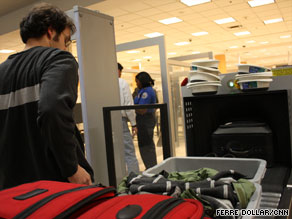By JD Rinne
(Budget Travel) -- Airport security is a traveler's rite of passage: the long lines, the ID check, the shuffling of personal items. Get through security faster with these easy strategies.

To move through security quickly, wear slip-on shoes, minimal jewelry and no belt.
Pack like you're making lasagna (no, seriously!)
You probably don't want a security official inspecting your carry-on bag by hand. Time-consuming inspections usually only happen when an X-ray machine operator can't identify items. Avoid this hassle by packing in a way that keeps your curling iron, hair dryer, and other hard-plastic or dense items separate in your bag, instead of allowing them to get tangled in a pile -- and look suspiciously like a bomb or a weapon on an X-ray scan.
Layer your electronics and toiletries in between your clothes like you're spreading ricotta cheese in between strips of pasta to prepare lasagna. Put heavy clothes on top to act as a weight and secure loose items.
Remember the 3-1-1 rule
If you plan to go carry-on only, any liquid should be kept in a 3.4-ounce bottle or smaller. You're only allowed as many bottles as can fit in one quart-size, clear ziplock bag. Find bottles in your local drugstore's travel or $1 section, or online.
Buying products packaged in small amounts can be expensive: We recently found face wash in a two-ounce bottle for for $9, shaving cream for about $6, and contact lens solution for $10.50. By transferring your liquids from standard-size bottles into TSA-friendly containers, like these squishy bottles from humangear.com, you should save a lot of money.
Dress for success
Slip-on shoes (preferably with socks; think of the dirty feet that have been on that linoleum), minimal jewelry and no belt is the standard uniform for moving through security fast. If you insist on wearing jewelry and a watch on the plane, take them off and slip them into a pocket in your carry-on before you enter the security cordon.
Don't Miss
- Budget Travel: 7 ways to annoy a flight attendant
- Budget Travel: 6 strategies for finding lower airfares
- Budget Travel: America's favorite restaurants
- In Depth: Road Warriors
Use flight-ready toiletries
Keep your travel bag stocked with "flight ready" items that don't break the TSA's liquid rules, such as solid perfume, and lip balm instead of lip gloss.
Buy a TSA-approved laptop bag
The TSA allows laptops to go through the X-ray in checkpoint-friendly laptop bags, like a simple $20 Skooba Skin. The most common and cheapest is a laptop sleeve. Consumer Reports recommends a few here. Laptops are also among the most-forgotten items at security, so label yours with a business card or ID tag.
Keep an eye peeled for new security programs
Fifty airports (including Boston, Chicago, and Seattle) have security lines split among Expert, Casual, and Family travelers. Look for the signs and hit the line that's right for you -- we suggest Expert now that you've read our tips.
Also, remember that 18 airports and five airlines are currently participating in the Paperless Boarding Pass pilot program. If the program covers your flight, you can go straight to the security checkpoint and use your cell phone as a boarding pass. Read about it on our blog.
It's showtime
Once you've presented your ID and boarding pass, get moving. Find the shortest line -- look especially for lines toward your left because studies show that Americans are more likely to turn right than left when entering a building, so lines on the left will tend to be shorter.
Grab two bins. The TSA is asking travelers to put shoes directly on the X-ray belt, so do that first. Pull out your quart-size bag of liquids and small electronics (like an iPhone) and lay them on top of your jacket. In the second bin, put your laptop (or, if you've got just got one bag or purse, use this bin for that).
After successfully passing through the metal detector (because we know you will), grab your shoes and slip them on, then snag your other belongings and slip them back in your bag. Look around quickly for anything that may have come loose, and then exit the security area to keep the line moving.






